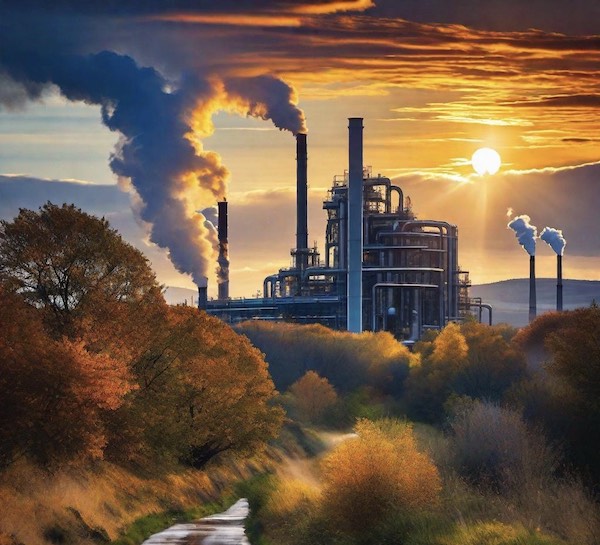Unearthing the Pitfalls: The Complex Reality of Fossil Fuels
Written by Adam Bird on 09/14/2023
Fossil fuels have long been the backbone of our global energy infrastructure. These energy sources, which include coal, oil, and natural gas, have powered economies, illuminated cities, and driven technological progress for over a century. However, as the world grapples with environmental concerns and the need to reduce greenhouse gas emissions, there is a growing push to transition away from fossil fuels. In this article, we will explore the origins of the term “fossil fuels,” examine whether it’s merely an excuse to promote electric vehicles, and shed light on the connection to the 2030 agenda. Moreover, we will discuss the positive aspects of fossil fuels and why they should still play a role in our energy mix.
The Origin of “Fossil Fuels”
The term “fossil fuels” is not just a catchy phrase; it has a historical basis. It derives from the Latin word “fossus,” meaning “dug up.” These fuels are called “fossil” because they are formed from the remains of ancient plants and microorganisms buried deep within the Earth’s crust. Over millions of years, pressure and heat transformed these organic materials into the coal, oil, and natural gas we use today. Understanding the origin of the term helps us appreciate the long history of these energy sources and their vital role in human development.
Is it an Excuse to Push Electric Vehicles?
One contentious argument against the relentless push to transition away from fossil fuels is the suspicion that it serves as a convenient excuse to promote electric vehicles (EVs) and other green technologies. While proponents tout the virtues of EVs, it’s imperative to critically examine their purported benefits.
The positive aspects of EVs are often extolled, including their potential to reduce greenhouse gas emissions and combat climate change. However, what’s frequently overlooked is the considerable environmental cost incurred in producing EV batteries. Mining the raw materials necessary for lithium-ion batteries, such as lithium, cobalt, and nickel, involves vast energy expenditure and environmental disruption. The sheer amount of fossil fuels burned in this process raises questions about the net environmental gains achieved by EVs.
Furthermore, there remains a shadow of doubt cast upon the reliability of EVs. The range anxiety associated with limited battery capacity and the challenges of finding convenient charging infrastructure have hindered widespread adoption. While advancements in technology continue to address these issues, the transition to EVs is far from a seamless panacea for our transportation needs.
The relentless push for EVs as a solution to the fossil fuel dilemma may not be as straightforward as it appears. While their environmental benefits are championed, the ecological toll of producing their batteries and lingering concerns about reliability cast a pall over their role in a sustainable future. It is essential to approach this transition with a discerning eye, considering all facets of the equation. See article, “The Truth about Electric Vehicle Ownership”
The 2030 Agenda Connection
The 2030 Agenda for Sustainable Development, adopted by all United Nations Member States in 2015, does indeed emphasize the need for sustainable energy. Goal 7 of the agenda aims to “ensure access to affordable, reliable, sustainable, and modern energy for all” by 2030. While this goal promotes clean energy sources, it doesn’t explicitly call for the complete abandonment of fossil fuels. Instead, it focuses on reducing emissions and increasing the efficiency of fossil fuel use.
The Positives of Using Fossil Fuels
Fossil fuels have undeniable advantages that have propelled human progress:
- Reliability: They provide a stable and consistent source of energy, essential for industries, transportation, and electricity generation.
- Energy Density: They possess a high energy density, meaning a small amount can produce a large amount of energy, making them efficient for transportation.
- Economic Growth: Fossil fuel industries employ millions and contribute significantly to GDP, making them vital for economic stability.
- Energy Access: They remain the most accessible energy source for many regions, providing power to communities that lack alternatives.
- Technological Development: Fossil fuel industries have driven technological innovation, leading to cleaner and more efficient extraction and use.
Why Continue Using Fossil Fuels?
While the pitfalls are well-documented, an abrupt and complete transition away from them would have serious economic and social consequences. Instead, a gradual shift towards cleaner and more efficient technologies should be the goal. This approach allows us to leverage the benefits of fossil fuels while simultaneously working to mitigate their negative environmental impacts.
The debate over the future of fossil fuels is far from black and white. Understanding the historical significance of the term “fossil fuels,” acknowledging the need for sustainable energy, and recognizing the positive aspects of these resources are all important steps in crafting a balanced and realistic energy transition strategy. It’s essential to continue using fossil fuels responsibly while actively pursuing cleaner alternatives to ensure a sustainable and prosperous future for all.







